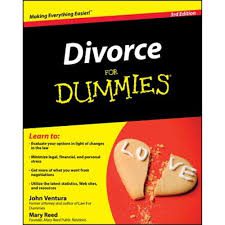Divorce For Dummies
Divorce for dummies offers a straightforward guide to navigating the emotional, legal, and financial complexities of ending a marriage.
John Ventura, a bankruptcy attorney and consumer law expert, collaborates with Mary Reed, a finance/legal writer, to create a guide designed to help individuals navigate the divorce process with less stress, confusion, and legal surprises.
What’s Covered — Key Features
Here are the main topics, structure, and the kinds of help the book offers:
| Part/Section: What’s | What’s Inside |
|---|---|
| Part I: When Your Marriage Is on the Rocks | Deciding whether to divorce, exploring alternatives, and getting emotionally and financially prepared. |
| Part II: Getting Your Divorce Going | Steps to initiate divorce, how to talk to children, and coping with emotional impact. |
| Part III: Deciding the Basic Issues | Dividing assets & debts, spousal support, custody, child support. |
| Part IV: Working Out the Details | Negotiation, mediation, choosing an attorney, and what happens if you go to trial. |
| Part V: After Divorce — Avoiding Problems & Handling Challenges | Life post-divorce: finances, visitation issues, personal recovery, rebuilding. |
| Part VI: “The Part of Tens” | Quick tips and checklists: “Ten ways to help kids cope”, “Ten tips for getting on with your life”, etc. |
The 3rd edition also updates material to reflect changes in law/society: collaborative divorces, same-sex marriages, common law marriages, visitation including pet custody, etc.
Who Will Benefit Most from This Book
- Someone going through or considering divorce who feels overwhelmed by the legal, financial, and emotional side. This book is geared to “everyday people,” not legal experts.
- Those who want to understand all the pieces: what choices there are, what questions to ask, and how to limit cost and conflict.
- People who prefer a practical, step-by-step guide with checklists and clear explanations.
- Folks who want to plan (financially/emotionally) and get tools to help children cope, etc.
Key Strengths
- Clarity and practical advice. The book avoids excessive legal jargon, focusing on what you need to know.
- Holistic approach. It covers both legal & emotional / family issues, which is important. Divorce isn’t just about paperwork.
- Updated for modern circumstances. Inclusion of topics like same-sex marriage, collaborative divorce, pet custody, etc., adds relevance.
- Resources & tips. Having the “Part of Tens” checklists is useful for quick reference.
Limitations / What to Be Aware Of
- U.S.-centric. The legal advice is based on U.S. state laws and norms. Those in other countries (or with cross-border issues) will need to adapt the info or get local legal advice.
- Some material might be dated. The 3rd edition is from 2009. Laws (especially around family law, custody, etc.) may have changed since then in many jurisdictions. Always check current local laws.
- Not a substitute for a lawyer. The book is a guide, not legal counsel. If your divorce is complex, contested, or involves large assets or serious legal issues, professional help is necessary.
- Emotional support is touched on, but not replaced. If you’re in a tough emotional place, you might need additional counselling or support beyond what a book can give.
Top Takeaways / Practical Tips from Divorce For Dummies
Here are some of the most useful actionable pieces of advice you’ll likely get from this book:
- Get your finances sorted early. Know where money comes from, what debts exist, and keep personal financial records.
- Consider alternatives (e.g. separation, counselling, collaborative divorce) before rushing into a full divorce.
- Be transparent and organised. Trying to hide assets or lurching into legal proceedings unprepared tends to cost more in the long run.
- Think of the kids first. How you communicate, how you handle custody and support, can significantly affect their well-being.
- Use mediation or negotiation if possible. It tends to be cheaper, faster, and less emotionally draining than full-court trials.
- Prepare for life after divorce. New routines, finances, support systems, adjusting emotionally, maybe rebuilding social or family relationships.
My Verdict — Is It Worth Your Time?
If I were you (or advising someone), I’d say: yes — this book is worth reading, especially early on when you’re trying to understand what divorce involves and what decisions lie ahead. It gives a structured overview, helps you ask the right questions, and can reduce surprises.
However, pair it with local legal advice, and check whether there’s a more recent edition or comparable guide in your country, to ensure the information is accurate for your jurisdiction.


Leave a Reply